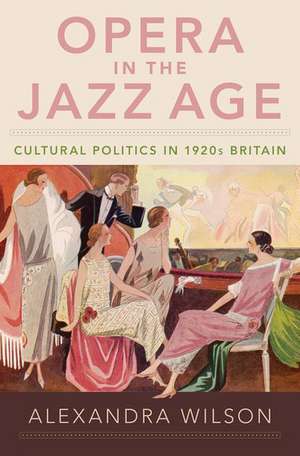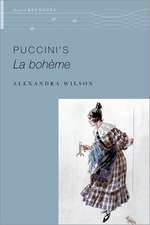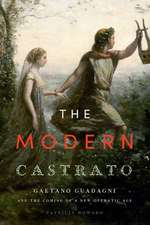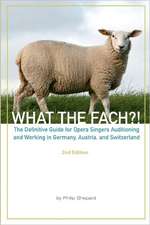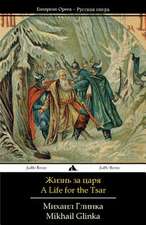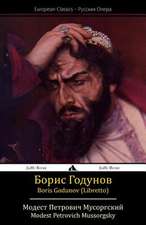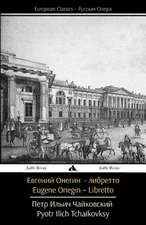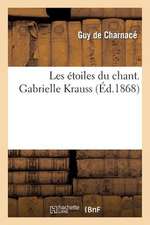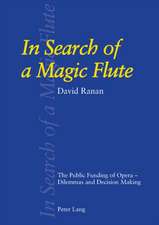Opera in the Jazz Age: Cultural Politics in 1920s Britain
Autor Alexandra Wilsonen Limba Engleză Hardback – 21 feb 2019
Preț: 366.95 lei
Nou
Puncte Express: 550
Preț estimativ în valută:
70.23€ • 73.04$ • 57.97£
70.23€ • 73.04$ • 57.97£
Carte disponibilă
Livrare economică 24 martie-07 aprilie
Preluare comenzi: 021 569.72.76
Specificații
ISBN-13: 9780190912666
ISBN-10: 0190912669
Pagini: 256
Ilustrații: 8 illus.
Dimensiuni: 236 x 163 x 28 mm
Greutate: 0.43 kg
Editura: Oxford University Press
Colecția OUP USA
Locul publicării:New York, United States
ISBN-10: 0190912669
Pagini: 256
Ilustrații: 8 illus.
Dimensiuni: 236 x 163 x 28 mm
Greutate: 0.43 kg
Editura: Oxford University Press
Colecția OUP USA
Locul publicării:New York, United States
Recenzii
This is an interesting book on a topic that has received little scholarly attention.
Scrupulously researched and forcefully argued.
Through extensive primary-source analysis, Wilson captures an historical moment in which opera maintained social mobility and mass-culture appeal. [...] Not only does [the book] call into question longstanding presumptions about the intersections of opera, class, and politics, but it also points to methods for defining a heretofore littlestudied middlebrow culture. Thus, by demonstrating opera's pervious "resistance to reductive labeling", Wilson begins to reveal the cracks in social hierarchies long papered over by faulty cultural assumptions.
A richly textured account
What a book. This is a glorious work of scholarship that's one of the most readable and intelligent scholarly monographs I've encountered. Seriously impressive.
Wilson is one of those rare musicologists capable of seeing opera in its widest historical context... Impressively researched and highly entertaining.
Wilson is interested in how opera, seen as a "foreign" art form, fit into the British cultural scene in the 1920s. She is particularly interested in where opera fit into the ongoing discussions of "highbrow," "middlebrow," and "lowbrow" art and efforts to combat charges of elitism... For Wilson, opera in the decade was interesting precisely because it could not be pinned down in this system of cultural categorization.
Alexandra Wilson's interest in the British operatic scene during the jazz age is longstanding, and, in this book, she imparts her wealth of knowledge in a lively and readable manner. She reveals that opera in the 1920s was the subject of fierce controversy-too highbrow for some, and not highbrow enough for others. Diving into impassioned, often rancorous, debates about opera, Wilson argues that much of the vexation was generation by peculiarly British notions of nationality and social class. It is essential reading for anyone who remains under the impression that this decade was an operatic wilderness in the UK.
Scrupulously researched and forcefully argued.
Through extensive primary-source analysis, Wilson captures an historical moment in which opera maintained social mobility and mass-culture appeal. [...] Not only does [the book] call into question longstanding presumptions about the intersections of opera, class, and politics, but it also points to methods for defining a heretofore littlestudied middlebrow culture. Thus, by demonstrating opera's pervious "resistance to reductive labeling", Wilson begins to reveal the cracks in social hierarchies long papered over by faulty cultural assumptions.
A richly textured account
What a book. This is a glorious work of scholarship that's one of the most readable and intelligent scholarly monographs I've encountered. Seriously impressive.
Wilson is one of those rare musicologists capable of seeing opera in its widest historical context... Impressively researched and highly entertaining.
Wilson is interested in how opera, seen as a "foreign" art form, fit into the British cultural scene in the 1920s. She is particularly interested in where opera fit into the ongoing discussions of "highbrow," "middlebrow," and "lowbrow" art and efforts to combat charges of elitism... For Wilson, opera in the decade was interesting precisely because it could not be pinned down in this system of cultural categorization.
Alexandra Wilson's interest in the British operatic scene during the jazz age is longstanding, and, in this book, she imparts her wealth of knowledge in a lively and readable manner. She reveals that opera in the 1920s was the subject of fierce controversy-too highbrow for some, and not highbrow enough for others. Diving into impassioned, often rancorous, debates about opera, Wilson argues that much of the vexation was generation by peculiarly British notions of nationality and social class. It is essential reading for anyone who remains under the impression that this decade was an operatic wilderness in the UK.
Notă biografică
Alexandra Wilson is a musicologist and cultural historian, with research interests focusing primarily upon opera and operatic culture from the nineteenth century to the present. She is Professor of Music at Oxford Brookes University (UK), where she also co-directs the OBERTO opera research unit. Her first monograph The Puccini Problem: Opera, Nationalism, and Modernity (Cambridge University Press) was awarded the American Musicological Society's Lewis Lockwood Award for a work of outstanding musical scholarship. Alexandra has a high profile as a public musicologist: she has presented numerous broadcasts for BBC Radio 3 and has written programme essays and given talks for the UK's leading opera companies.
